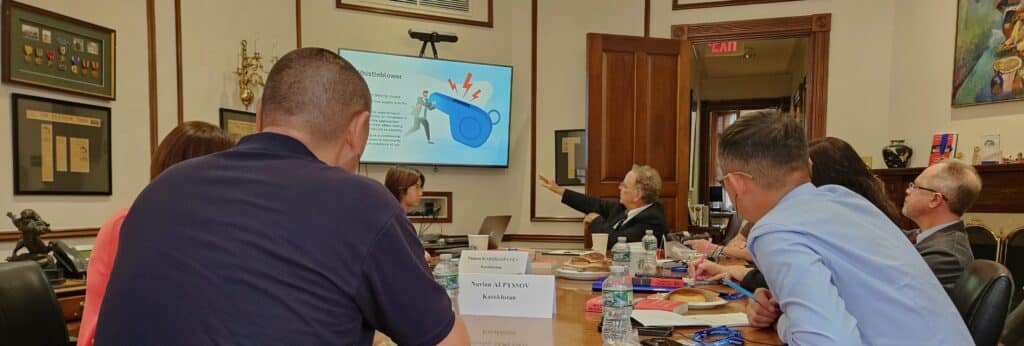A delegation from Kazakhstan visited Washington, D.C., to learn about whistleblower laws, transnational anticorruption, and the importance of whistleblower incentives. The delegation met with whistleblower attorney Stephen Kohn on July 29, 2025. Their visit is part of the International Visitor Learning Program (IVLP), which offers foreign professionals the opportunity to come to the United States and learn from experts and professionals.
The Kazakh delegation expressed that in Kazakhstan, they rely on typical law enforcement tools to detect corruption. Kohn explained that such efforts without whistleblowers are far less effective. “Crimes of corruption are intended to be hidden,” he explained. “The ability of law enforcement to learn of [corruption] on its own is very difficult.”
Kohn recommended that the Kazakh delegation pursue policies that encourage and incentivize whistleblowers to come forward. He presented a report from the Association of Certified Fraud Examiners that highlights how whistleblowers are the single most effective source of detection globally. “Once they realized this,” Mr. Kohn told the delegation, “there is a simple question: How do you get this source to come forward?”
Mr. Kohn reviewed U.S. laws that incentivize whistleblowers to detect fraud, starting in 1986 with the passage of the False Claims Act. Kohn explained that compensation contingent upon successful prosecution also incentivizes whistleblowers to present the best information and cooperate with the investigation, aligning the whistleblowers’ interests with those of the government.
Kohn went on to discuss the transnational reach of U.S. laws used to combat global corruption. These laws are the Foreign Corrupt Practices Act (FCPA) and the Anti-Money Laundering Act (AML). Kohn praised these laws as highly effective in transnational corruption enforcement.
He explained that FCPA prosecutions target companies paying bribes rather than officials receiving bribes. Therefore, prosecutions can be carried out under U.S. law even if the bribery occurs overseas. Kohn explained that the structure of the FCPA circumvents corrupt governments entirely, as the U.S. has jurisdiction per the FCPA over any company that an American could invest in, effectively any publicly traded company in the world.
Kohn highlighted two instances: one in which FCPA whistleblowers received $40 million and another in which they received $90 million. These figures were met with surprise and interest by the delegation. The reaction to the AML was similar, as Mr. Kohn highlighted the use of a whistleblower to accomplish the otherwise impossible detection of fraud by Binance as an example of the success of the AML. This case resulted in a $5 billion sanction against the company. Massive multinational corporations and high-level executives were the targets, as Mr. Kohn explained: “These laws are designed to target large, terrible frauds—attack it at the top.”
Mr. Kohn shared with the delegation a report of successful FCPA prosecutions by the U.S., including one in which Rolls-Royce paid bribes in Kazakhstan, with the sanctions resulting from the subsequent prosecution totaling almost a billion dollars.
“This is a revolution in law enforcement tactics. It is unknown to the vast majority of international law enforcement agencies. It is unknown to the vast majority of NGOs involved in anticorruption. We have probably delivered over 100 IVLP presentations across 80 countries, yet no one was aware of these laws. That is why we’re doing this today,” Kohn explained.
Kohn then went on to discuss the finer details of these whistleblower programs. He explained that the money to pay the whistleblower awards comes from the sanctions collected from the companies and that no external government funding or appropriation was necessary. He further highlighted that confidentiality and anonymity are included in the laws, which prevent the agencies from using information that could “fingerprint the whistleblower.”
The Kazakh delegates will return to Kazakhstan with a new understanding of the importance and efficacy of whistleblower reward laws as an effective tool to fight corruption.
